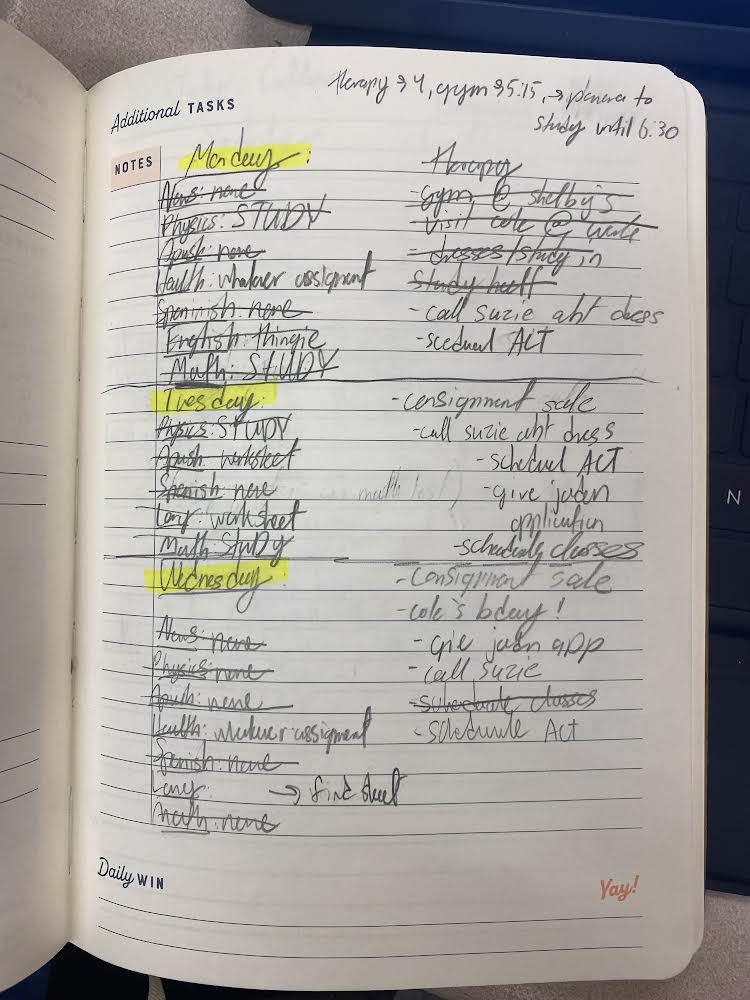You come home from school, upset and drowsy. You haven’t really had a great day. Your test grade wasn’t what you hoped for and you’re having relationship problems with some of your best friends. Despite this day, you can’t help but think about everything else you need to get done today. You demand yourself to get your two hours of homework done, remind yourself to be on time for practice, make sure your laundry is done before you go to sleep tonight, and so on. Oh yeah, you have a doctor’s appointment tomorrow too. Make sure you don’t forget!
Your mind does not shut off. It is constantly moving and full of little voices that pressure you to make sure you feel fulfilled by the end of your day. For many students, they live with their brain stuffed with expectations every single day.
Many Norwin High School students struggle with these self-expectations constantly. Brain chemistry, upbringing, and even personality plays into why some people, especially students, may think with this demanding mindset. In order to obtain a more content mindset and a less stressful lifestyle, students need to understand how wanting to be productive, rather than needing to stay busy, will allow them to end their day feeling accomplished and satisfied. To achieve this euphoria, students must first understand the difference between being productive and being busy as well as the difference between a want and a need.
Busy vs. Productive
There is a difference between staying busy and being productive. Staying busy means having a lot scheduled, but it does not really mean that those things being scheduled are productive. Being productive means to complete a task or get something done that is beneficial. Vise verse, you do not have to be busy to be productive.
The next thing to understand is how “want” and “need” differ. The word want is defined as “to have a desire to possess or do.” The word need is defined as to “require because it is essential or very important.” Now let’s connect these two definitions with busyness and productivity. Those who want to live productive lives want a fulfilling life with many experiences, but those who need to live busy lives end up believing that everything in their day must happen or get done because they are “essential” or “very important.” Thus if someone has both a busy schedule and the idea that everything on that schedule is essential to their life, then they are more likely to deal with the stress of feeling pressured to make everything on that schedule happen. For example, on Monday a student chose to spend their day after school shopping at the store, watching TikTok, and going to the school’s basketball game. However, the student had to make sure they did all of these activities because that’s what they planned. That student had a busy day. On Tuesday that same student wanted to get things accomplished. They chose to come home from school and complete their homework, clean their room, and do their laundry. On Tuesday, that student had a productive day.
Attempting to have a filled schedule and a set of expectations everyday can be extremely taxing to emotional health and physical health. Oftentimes, it also causes problems with relationships and balancing work and school with life.
Negative effects of being too busy
There are many emotional effects that are a result of that need to be overwhelmingly busy. Verywellmind.com suggests that anxiety, depression, increased stress, frustration, anger, loneliness, and hopelessness are all emotional health effects that can be caused by taxing self-expectations. Physical health can also be affected. One main contributor of this is, when a person is always busy, they often neglect sleep because they don’t know how to simply stop and relax. This lack of sleep can cause muscle tension, insomnia, headaches, fatigue, digestive issues, and even cardiovascular disease. Demanding schedules can also lead to issues in relationships. When being so caught up in life, people disregard maintaining “meaningful connections with others,” states verywellmind.com. This creates the consequences of feeling loneliness and isolation.
These effects can be extremely detrimental to students especially. Having to live with both mental and physical stress as well as disregarding relationships can play a huge role in how students become accustomed to living. If being overwhelmingly busy is not addressed now, students may neglect to enjoy their educational childhood and forever go through life with these tiring effects.
Why people choose to live constantly occupied
So, considering all of the negative effects of overplanning a busy schedule, why do students continue to do it? The answer lies solely in the fact that, you guessed it, they feel the “need” to. Students are pressured, either by themselves or by others, to feel as if everything in their day must be accomplished. There are various different reasons why students feel this way.
“I believe that people often overschedule themselves due to obligation guilt, poor boundary–setting, people-pleasing, and/or the fear of missing out,” said Savannah Thompson, Norwin High School’s social counselor. “It is important to recognize however that over-scheduling may contribute to burnout. This may look like completing tasks you no longer enjoy just to cross them off your to-do list.”
Thompson also concludes that toxic productivity, perfectionism, and comparison can be leading factors as to why students feel a need to stay occupied. “All of these may cause you to be overwhelmed by the task at hand and lead to a type of cognitive paralysis, where you end up doing nothing at all,” said Thompson.
Many Norwin Students can relate to Thompson’s insight. A recent Norwin poll collected information as to why students feel as if they have a need to be constantly busy.
“I think I need to be productive mostly because of my self-worth,” said an anonymous poll-taker. “I feel like if I don’t do one specific thing at a specific time, everything is going to go downhill. Then, I end up spiraling into this abyss of self-despair and anger. I get so angry at myself, but at the same time, I procrastinate a lot. That affects my self-worth, too. It’s just such an endless cycle for me.”
While a lot of students do deal with this feeling of constant obligation, there are reasonable explanations for it. In turn, a busy schedule does look appealing, and sometimes it truly is beneficial. Junior poll taker Molly Geissler is always running around with a million things to do but asserts to have good reason behind her restless schedule.
“I feel as though I need to fulfill my purpose and enjoy the life I have been given to the fullest,” said Geissler. “I feel like I was meant to make connections and do that through staying busy with different things and people. If I simply go home after school and do nothing, I could be doing something else or something better and I feel like my purpose isn’t achieved.”
Like Geissler, a lot of students at Norwin have reasonable and even inspiring answers as to way they choose a busy life. It is important to recognize that this lifestyle can be very beneficial, too.
“A busy schedule can often lead to growth,” said Thompson. “It helps us stay motivated and feel valued.”
Although a busy schedule can be helpful, problems begin occurring when people develop that need or “obligation” to be busy.
Because the commitment to tiring hustle has expanded so much across Norwin High School, it is important for this issue to be addressed now. Students must now learn how to shift from a need for busyness to a want of productivity in order to live a more healthy psychological and physical lifestyle. But…how is it done? And how do you know where to start?
How to know if you are a busy person and how to change it
In order to shift to a mindset and lifestyle that doesn’t require constant activity in order to feel fulfilled, one must understand how to overcome filling up a busy schedule.
To achieve increasing productivity, a person first should recognize whether or not they are a busy person or a productive person. According to blog.superhuman.com, there are seven signs that show a person is simply just, busy.
If a person connects to these habits, they are most likely a busy person, but not necessarily productive. On top of these traits, evaluating yourself on whether or not you feel pressure to get everything done in one day is also an effective method at understanding if you are a “need to be busy” person. If you find yourself stressing about getting all the activities done on your checklist, you do feel that you need to get them done. Also, if you find that you are more of a productive person, but still find yourself stressing about getting everything done, you may deal with toxic productivity, or having that obligation to be productive. Although it is important to keep in mind that being busy is not always a bad thing, it is when you begin having that “need” to be busy feeling.
The importance of prioritizing
To become more productive while also maintaining a calm mind, a busy person should focus mainly on prioritizing and focusing on the task at hand. People who are busy usually prioritize everything on their to-do list. To become more productive, one must come to the realization that there is only so much time in a day. If a busy person can focus on two or three important things to get done in one day opposed to five or six, they are more likely to actually get those tasks done, without distractions and without feeling overwhelmed. This prioritization eliminates the “need” factor in a busy person’s life.
People who are sincerely productive, but might still feel like they constantly have an overwhelming schedule, most likely deal with the issue of once again, prioritizing. However, this is different from how busy people prioritize. Productive, but overwhelmingly busy people tend to prioritize everything everyday. This can cause extreme stress and a frantic mindset. To change this, a person needs to choose the most important tasks on their to-do list and make sure that they complete those tasks in a timely manner. The person must accept that some things are more important than others, and those things should be prioritized. This does not mean that someone cannot do other things throughout the day. Oftentimes when people prioritize a few things to do in one day, more time is left over to do other activities that are enjoyable for that person.
Learn to relax, too!
Furthermore, as important as it is to stay productive and fill your schedule with busy, but beneficial, activities, it is just as important to take time to just relax. Not everyday needs to be centered on getting things done. Interestingly, taking a rest day actually increases productivity on non-rest days. Perpetual Guardian, a New Zealand-based company, conducted an eight-week trial on this theory. The company gave over 200 of its employees an entire extra day off per week while keeping conditions and salaries consistent. Jarrod Haar, a Professor of Human Resource Management at Auckland University of Technology, found that employees were 20 percent more productive on the days they returned to work. Also, employees asserted to be happier on those work days! What a win, right?
So is putting in the effort to change a certain lifestyle worth it? Absolutely. Even though the changes are not major, they can absolutely benefit a person’s headspace in life.
“I love doing things, and I’ve always had this inability to sit still and do nothing,” said junior poll-taker Hanna Klingensmith. “If I’m not doing something, I’m thinking of what I could be doing. Whether that’s cooking or baking something, reading a book, studying, or sending my friends videos on Instagram or TikTok. No matter what I end up doing, I feel my best when it’s productive. I can only scroll so long before I get agitated and need to do something physically productive.”
In fact, people who find this change difficult are still benefiting if they are able to simply shift their focus to a few priorities a day. This means that, as long as those priorities are completed, they have the rest of the day to fill their schedule if they please. Increasing productivity gives a person increased energy, improved creativity, mental alertness, and the ability to maintain positivity. (lifesorted.com)
Keeping a productive schedule is a more beneficial lifestyle choice and maintains psychological balance while having a constantly busy schedule has many negative consequences.









